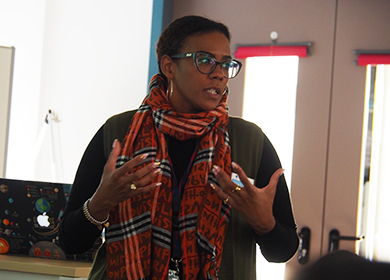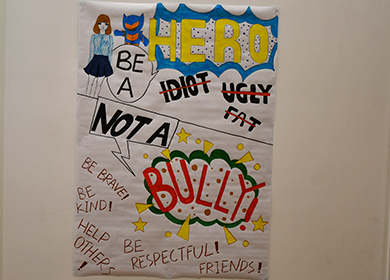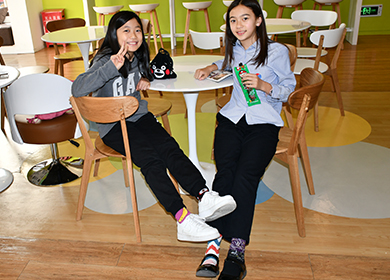Go Back
News
News
Staying Close to Prevent Bullying
News
06 Dec, 2019
10 : 00
During the week of 25th - 29th of November, the Yew Chung International School of Beijing held Anti-Bullying Week, an initiative whose critical goal is to raise awareness on bullying, especially in schools. During this week, our school community focused on educating students about bullying, as part of character formation, a crucial part of our driving principles.
Activities included “Odd Socks Day” where all students and staff were encouraged to wear an odd, non-matching pair of socks to emphasize the importance of remaining kind even in our differences. School initiatives are wonderful in that teachers spend a lot of time with students, but what can parents do and how can they identify bullying in their children either as victims or perpetrators?
We spoke to School Counsellor, Rachel George to give parents some tips on how they can identify these behaviours.
What is bullying? How can parents identify when their child is being bullied?Bullying is different than mean behaviours. While both are hurtful and not acceptable, bullying is not a one-time act. Rather, it is an ongoing pattern of behavior. There is an intention to cause harm with a bullying event, and in most cases there is an imbalance of power, meaning it is harder for the person being mistreated to defend themselves.
The most important way for a parent to identify if their child is being bullied is to understand that while children may not talk openly about a bullying situation. However, you can look out for the following signs that may be an indication: mood swings, change in eating habits, difficulty sleeping, loss of interest in school, headaches or stomach aches- often associated with attending school or school events. There also may be a noticeable drop in grades or changes in friendships. If you notice any of these things, be sure you start a conversation with your child. Then, stop and listen. Let your child do most of the talking and only ask questions if you need to clarify something. Make sure your child knows that you are proud of him/her for sharing with you. And remind him/her that it took courage to talk about bullying.
How does YCIS Beijing raise awareness and prevent bullying?Through our Life Skills curriculum, we teach students the differences between healthy and unhealthy friendships. Students are taught the differences between teasing, peer conflict, and bullying. It is important that we teach students to be kind with their words and to recognize how words can be hurtful. Creating an atmosphere of kindness and respect is essential in preventing bullying behaviors.
How can students in our school raise awareness around bullying?Students can start by having empathy for each other- understanding what it feels like to be bullied and making a commitment to be kind. Through kindness campaigns and encouraging others to be kind. Raising awareness of the seriousness of bullying is also an easy way. When students teach their peers, it is powerful.
Why is it important for our students to get involved?The more we educate our students about empathy, the more empowered they will be to stand up for others and not be what we call a “bystander.” We teach students to not only advocate for themselves but for others as well.
Why do some children bully others?It is important to remember that children don’t bully others because they are bad kids. We all engage in behaviors sometimes that are not reflective of who we are as a person. There are many reasons why a child may choose to be unkind. Perhaps they are trying to fit in with their classmates. Some children who bully crave power- maybe they have lost their personal sense of power somewhere. Some children are looking for attention from teachers, or their parents and act out in order to receive attention. Other times, a child may not understand fully how their words or actions may hurt another person. .
How can parents help their children deal with bullying?Talk through the situation with your child- try to find out exactly what is happening so you can alert school. If your child is reluctant, externalize the problem- choose a book with the subject matter, or you may see a situation on a TV show and use it as a conversation starter by asking, "What do you think of this?" or "What do you think that person should have done?" This might lead to questions like: "Have you ever seen this happen?" or "Have you ever experienced this?" You might want to talk about any experiences you or another family member had at that age. Encourage your child to speak up and tell a trusted adult at school if and when the bullying behavior occurs. Remind your child that the bullying behavior is not their fault and you are proud of them for letting you know.
Our commitment to child protection is ongoing, which is why all our staff also takes part in Anti-Bullying courses to aid students when need arises.












